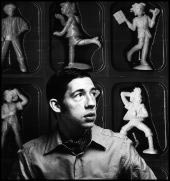Pop music is political, often in ways listeners never consider. That fact was hammered home last week when a list—allegedly issued by the world’s largest radio network, Clear Channel—started making the rounds, drawing national attention from sources ranging from JAMPAC to The New York Times. Although ultimately unveiled as a hoax (which might explain why Petula Clark’s harmless hip-shaker “A Sign of the Times” was included but Prince’s 1987 hit “Sign ‘O’ the Times,” which catalogs how society is going to hell, wasn’t), the list sparked plenty of discussion about censorship in the music community.
As a DJ, I was already wrestling with concerns of self-censorship and inspirational programming when I saw the fake list. Repacking my crate for a gig last Tuesday, I decided Robbie Fulks’ “Dancing on the Ashes” (from his excellent new Couples in Trouble), about two brothers gone to war, was out. But I still played “Open Your Eyes” by new wave supergroup Lords of the New Church, which warns of the consequences of military chic, video games, et al. infiltrating consumer culture. Now is not a time to be timid about provoking difficult, even conflicting, thoughts and emotions.
My colleague in New York, DJ producer Adam Goldstone, faced the same dilemma. “I’ve been thinking about this, as I’ve been expecting to have to have some appropriate records for my gigs,” he e-mailed. At an impasse, he began brainstorming. “Let’s see . . . Eddie Kendricks’ ‘Going Up in Smoke?’ Too dismal . . . ‘Love Is the Message?’ Well . . . love is always the message. Love Committee, ‘Law & Order’ . . . not bad. The Undisputed Truth, ‘You Make Your Own Heaven and Hell Right Here on Earth’—as long as you’re not playing to a crowd of rednecks with war fever.”
Pop music is political—but what about dance music? It’s just mindless beats and divas wailing pointlessly about the vagaries of “pride” and “love,” engineered for pure escapism, right? That’s not political. But Goldstone—who just released his debut full-length, Lower East Side Stories (on Nuphonic)—a vibrant portrait of downtown New York rendered in shades of house, dub reggae, Latin, and neodisco—disagrees.
“Dance music is all about black people and white people, gay people and straight people, stripping down and getting sweaty together. And that’s very troubling to certain people,” he observes. “Frankly, I find [dance music] a lot more threatening than a lot of the rock music that takes pride in its supposedly anti-authoritarian pose.”
Goldstone ups that ante on his album, celebrating the diversity of cultures found on the Lower East Side with tracks like “In the Garden,” a paean to the community gardens that serve as oases in Manhattan’s grittiest neighborhoods. “Obviously the challenge of doing music—particularly dance music—with any kind of message is you can’t make people think so much that they keep moving,” he says. “Style Council in the ’80s was a good example . . . [Paul Weller’s] heart was in the right place—and some of the tracks were pretty good—but they were ruined by overblown, ham-fisted political sentiment. So the idea is [to] try and put this across in relatively subtle ways.”
The exception here is “Jacktalk,” featuring a six-minute spoken monologue by downtown filmmaker Micky Hohl about how pursuit of material riches has been our ruin. “That one I wanted to be totally in your face, with the assumption that it wasn’t going to be the big club track of the album,” the producer explains. “The point where it is [in the program] is the darkest. I tried to structure the album like a DJ set; that’s why the early part of the record is lighter, then it gets darker and darker, and then sleazy and mellow at the end.”
Aside from smaller gestures—like refusing to patronize Starbucks or McDonald’s and buying recycled, non-chlorine-bleached toilet paper—Goldstone’s politics surface in another way. “I’m signing a publishing deal, and one of the sticking points was that I wanted absolute right of approval over where my songs might be placed.” In an era where popular music and advertising jingles are interchangeable— and Moby not only accepts, but encourages, the practice of major corporations licensing his tracks for TV commercials— it’s an unusual move.
Lower East Side Stories (which includes performances by disco vets DC Larue and Fonda Rae, as well as Jonny Sender of no-wave funk combo Konk) is political pop music in the best sense, thought-provoking and escapist. And, hopefully, winning enough to circumnavigate some politics unique to dance music. “Most of the tracks are . . . in the 110 [beats-per-minute] range, which means it’s too fast for hip-hop DJs and too slow for house DJs,” Goldstone laughs. “I’m doing myself a big favor.”






